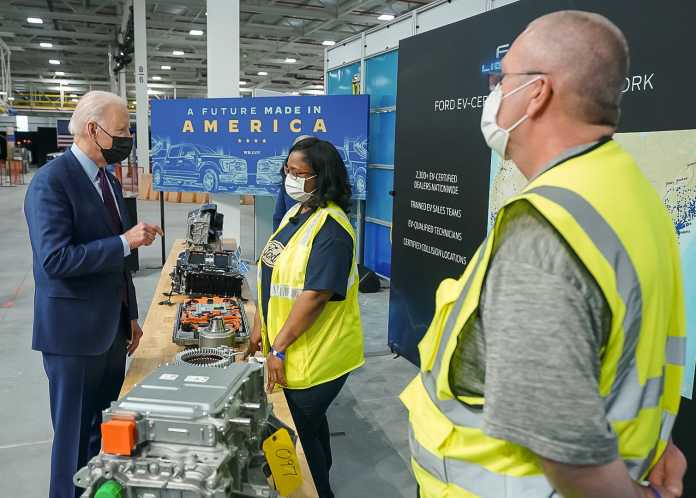A recent article at Breitbart reveals the folly of Ford’s EV transition, made ostensibly in pursuit of slowing or stopping climate change. Amid a substantial push by the Biden Administration towards promoting electric vehicles (EVs), Ford Motor Company has announced that they are laying off thousands of employees to pay for their transition. This is a foolish move on Ford’s part, as pointed out by the Breitbart post, and will not protect the environment or help families save money.
The Breitbart article, “Report: Ford to Cut About 3K Jobs amid Transition to Electric Vehicles,” written by Amy Furr, correctly makes the connection between the rising costs of EVs and Joe Biden’s insistence that citizens buy more electric cars and transition away from fossil fuels.
Citing a recent article in the Wall Street Journal, Furr writes that “Chief Executive Jim Farley said Ford had too many employees “and that the existing workforce doesn’t have the expertise needed to transition to a portfolio of electric, software-laden vehicles.”
Not only is Ford laying salaried employees off in the thousands, but they also are raising the price of their upcoming electric vehicles.
Furr explains that the company “recently increased the starting prices of its electric F-150 Lightning truck by over $8,000 because of material costs rising and additional factors.”
This is despite the fact that electric vehicles are heavily subsidized by government.
Transportation Secretary Pete Buttigieg admits that the pain families are feeling over high fuel prices is, in his administration’s view, a good thing, because it might make EVs more attractive. “The more pain that we are all experiencing from the high price of gas, THE more benefit there is for those who can access electric vehicles,” Buttigieg told Florida Representative Carlos Gimenez at a recent House hearing.
Indeed, Buttigieg is revealing the administration’s endgame, and their obsession with climate activism, in that statement. There is no denying that recent mandates helped to push this change; between new regulations from the Environmental Protection Agency (EPA) and U.S. National Highway Traffic Safety Administration (NHTSA), which were crafted to push manufacturers towards increasing the number of EVs they produce. Environment and Climate News (ECN) reported, here, that the new emissions regulations from EPA and updated, strict Corporate Average Fuel Economy standards (CAFÉ) from NHTSA would likely cause the costs of vehicles across the board to skyrocket. The new regulations require unprecedented lowering of emissions and massive gains in fuel economy.
“The only way that these standards can be met is if the auto industry can build enough electric vehicles quickly enough and if enough consumers want to buy them,” Myron Ebell, director of the Center for Energy and Environment at the Competitive Enterprise Institute, told ECN. “Neither is remotely likely, although the regulations are designed to force people into buying EVs by making gas and diesel-powered cars and trucks too expensive, but the prices of electric vehicles will climb as well.”
Climate Realism has previously discussed the issues with completely electrifying transportation, here, for example, where California began asking citizens to refrain from charging their vehicles during prime electricity use hours, due to the instability of their increasingly overburdened grid.
In the post “Testimony on the Folly of Electrifying the U.S. Transportation System,” Climate Realism reports on the testimony of Robert Bryce, a visiting fellow at the Foundation for Research on Equal Opportunity, who told Congress that the continued subsidies of EVs would result in catastrophic economic harm on American citizens, and that the materials needed for EV construction would result in a net environmental detriment.
The simple fact is that electric vehicles and their manufacturing cannot exist without oil, gas, and other fossil fuel use. Car battery cases, interior displays, dashboards, and tires are just a few things EVs need that are made with oil and its byproducts, not to mention the fuel needs of industrial manufacturing plants themselves.
As long as the price of fossil fuels stays high, so too will the price of EVs, regardless of government subsidies. Breitbart was right in reporting on the connection between economic pain and the push for EVs. The 2000 Ford employees being laid off in Dearborn, Michigan alone will now have to deal with joblessness, high fuel prices, higher combustion engine and electric vehicle costs, all in pursuit of the current “green” agenda.





















Yes, it does appear the rush by Ford to fire it’s employees closing out internal combustion engines, essentially mandated by the Biden Administration, switching to electric vehicles is tilting at windmills.
Meanwhile, more realistic governments in China and India are continuing industrialization, modernizing their factories and educating their workforces to make their economies even more competitive and thereby supportive of their populaces and continuing the displacement of manufacturing away from the US and toward their own countries, with a basic understanding of thermodynamics and where it interacts with economics.
Buy futures in ox carts and saddle & harness makers.
A quick look at the math:
America generates annually, using 99 percent traditional power sources (hydro, coal, oil, natural gas, uranium) about four trillion kilowatt hours (Kwh) of electricity to power our grid and run our homes, offices, stores, internet, etc. NOT in charging 270 million EVs. The additional one percent of electricity generation comes from small-scale solar. The EPA has created a metric, “MPGe,” for EVs. An EV will use 33.7 Kwh of electricity to travel as far as a GV [gasoline vehicle] on one gallon of gasoline. Replacing 123 billion gallons of gasoline will require four trillion Kwh, or double what the nation generates and uses today. See the problem? California can’t even keep the lights on today.
https://the-pipeline.org/green-energy-lets-do-the-math/
Even if our entire vehicle fleet is electric it won’t make a dent in the climate or air quality. In fact, due to the extreme weight of electrics, the debris from rapidly wearing tires might increase the air pollution. Whenever Denver for example has the “brown cloud” it’s mostly dust and road debris thrown up from the heavy traffic, electric vehicles will do worse.